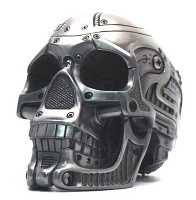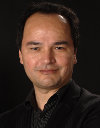Blog
We are Cyborgs
 In this blog I was going to posit what the future of the Internet is by comparing it to previous technological revolutions. No surprise really. Media History is my favourite topic because I like to find the syncronicities between old and new media. I'd even written drought versions of the next eight blogs that would investigate Internet and New Media development in even more depth. However, last night there was a re-run of Terminator 3: Rise of the Machine (1993) and whilst watching it I thought "Most people think that a Cyborg is something like the Terminator. Wouldn't it be interesting to show that we're actually the Cyborgs?" This would be a good foundation for understanding the importance of the Internet but it might even challenge the reader to a new worldview."Every cultural era is predisposed to a worldview that obsolesces other world views" (Jung, 1966, p.98)
In this blog I was going to posit what the future of the Internet is by comparing it to previous technological revolutions. No surprise really. Media History is my favourite topic because I like to find the syncronicities between old and new media. I'd even written drought versions of the next eight blogs that would investigate Internet and New Media development in even more depth. However, last night there was a re-run of Terminator 3: Rise of the Machine (1993) and whilst watching it I thought "Most people think that a Cyborg is something like the Terminator. Wouldn't it be interesting to show that we're actually the Cyborgs?" This would be a good foundation for understanding the importance of the Internet but it might even challenge the reader to a new worldview."Every cultural era is predisposed to a worldview that obsolesces other world views" (Jung, 1966, p.98)
Machine: "structure of any kind... apparatus, appliance" (Online Etymology Dictionary)A Cyborg is a person whose physiological functioning is aided by or dependent upon a mechanical or electronic device. Simple examples of this are things like hearing aids which are mechanical devices that enhance hearing, spectacles which enhance vision, pace makers which keep hearts beating or even the most extreme version found in Sci-Fi movies like Terminator 3. However, humans began mechanically extending their capabilities a long time ago. Right back to the very start of humanity. So much so that we now see these mechanizations as natural.
The first language of Humans was mathematics. What happened when we discovered mathematics is that we created symbols for it so we could interpret and use it. When early humans scratched lines to represent quantity they were creating a tool, a machine, to store information for later retrieval or presentation. Marshall McLuhan is famous for illustrating how our inventions are actually extensions of our bodies. In the above example, the symbols we created for numbers are tools that we use to extend our brains memory capability. Something else happened when Humans created symbols. We created something totally new. We abstracted the natural world by presenting it in a new form and by doing so created a simple written language that was totally unique to Mankind.
Humans then evolved from simple grunts and gestures and created another mechanical device to extend memory and enhance communication. They created words. If you think about it, who first spoke the word "Cat". It has no direct link to the furry mammal we all know. The sound isn't onomatopoeic like the word "Boom" which mimics the actual thing. It is an abstract representation of the the small furry animal that we in the English speaking world have been taught means Cat. This creation of spoken language allowed Humans to transmit information faster to each other and therefore gain more knowledge.
Plato went even further by adding vowels to the Phonetician alphabet so we could spell out words like "Cat". The Alphabet is another mechanization that we created to extend our natural capabilities. These extensions of our bodies are evident in every artefact we've ever created. Here's some recent examples:- The engine of a car is an extension of our muscles and allows us to travel farther. The fuel tank is an extension of our stomach and provides the energy needed to travel long distances.
- Telephones are an extension of our voice and allow us to speak around the World
- The Television is an extension of our eyes and ears
- Shoes are an extension of our feet
- Clothes are an extension of our skin
- Cups are an extension of our hands for holding liquid
- Knives are an extension of our teeth
- What is a computer an extension of?
Can you see how our "physiological functioning is aided by or dependent upon a mechanical or electronic device"? Though we may not be Terminators we can definitely be seen as Cyborgs.
These inventions we've made also reshaped reality as we know it such as Mass Media creating simplified representations of humans as mass markets to sell products to or Government's shaping the views of a Nation through the invention of Propaganda. What might be even more interesting is how our extensions are now evolving beyond us.
When Alan Turing (Turing, 1950) proposed that is was possible for machines to think it may very well be one of the defining moments of Human evolution because now our inventions were not just an extension of us; but could become our own abstraction of life itself. Turing's work can be seen as the basis of what we now know as Artificial Intelligence. I'll discuss these ideas in my next blogs.
Bibliography
Turing, A.M. (1950). Computing machinery and intelligence. Mind, 59, 433-460
 About
About
Brynn


